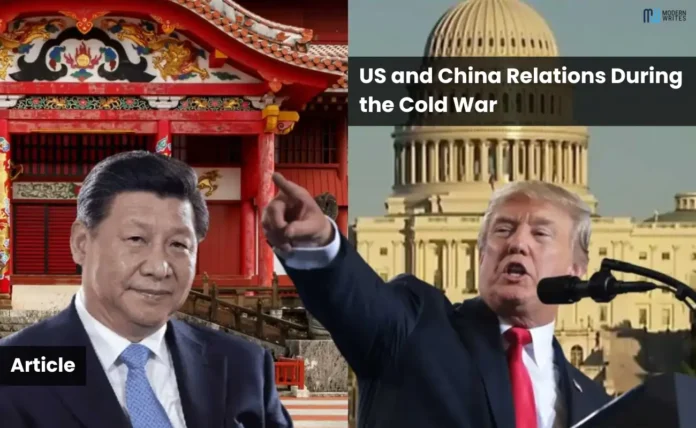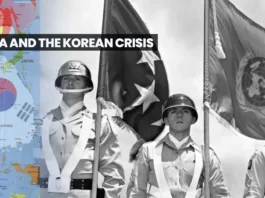US and China Relations During Cold War
During the Cold War period of geopolitical tension, the United States of America and the Soviet Union did not form relations; however, both sides were in a race to show their military power inside and out. US and China Relations During Cold War
Moreover, China used the Spanish war for its own benefit. From the 1950s onwards, the triangulation in the relationship between these three superpowers had significant implications for global policy. US and China Relations During Cold War
The fierce competition between the Soviet Union and the United States has been paid much attention to, but the trend of how the two countries saw each other is as crucial and fascinating to consider. This article explores the ties between US and Chinese relations during the Cold War from various angles, including China’s support for the U.S. during the Korean War and the opening of the American market to Chinese goods. The paper examines the evolving relationship between them and the impact these convergences have on international politics within this framework.
Emergence of the Post-Cold Civil War
The establishment of the People’s Republic of China (PRC) in 1949 marked the beginning of a post-Civil War China. This was the driving force behind the ever-changing relationship between the United States and China during the Cold War.
The triumph of the Communists under Mao Zedong, which occurred in 1949, marked the beginning of the Cold War and the deterioration of the ties between China and the United States, which had initially backed the nationalist government of Chiang Kai-shek. This, in turn, led to China’s isolation and separation from the United States.
The countries that supported them were China, which supported North Korea during the Korean War from 1950 to 1953, and the United States, which supported South Korea. Apparently, the split between the countries was a significant source of discord. During this stage of the Cold War, the Taiwanese question has been the most sensitive issue for Washington and Beijing to handle with each other.
General Chiang Kai-Shek’s defeat of the Kingdom of Ming shifted the nationalist government’s focus to the city of Taiwan. However, until 1979, the United States of America did not recognize any other government of Taiwan as the legitimate government of China. During the period of One-China policy, Taiwan included Taiwan on the list of countries and did not act as the legitimate government. Consequently, the two superpowers developed an oppositional stance. The PRC regarded Taiwan as a fully autonomous territory and sought to bring Taiwan and the mainland together through an eventual reunification.
Richard Nixon’s US and China Relations During Cold War
During Richard Nixon’s early 1970s premiership, the US President’s historic trip to China in 1972 opened China to the United States and facilitated a rapprochement between the two nations. Whether it was Nixon himself or the perceptions he formed after his visit to China, it was the initial catalyst for the rapprochement between Nixon and Kissinger.
Nixon and his National Security Advisor, Henry Kissinger, arranged this unprecedented diplomatic conduct. It became the historical beginning of the so-called “thaw” in relations between these two countries—the USA and the USSR. The reconciliation between the United States and China followed shared strategic interests, with the goal of reducing Soviet Union power and creating a stable region in the Asia-Pacific.
Strategic Alignment and Diplomatic Manoeuvring
In this very complex and confrontational picture, US and Chinese relations during the Cold War had to find a fine balance between cooperation and competition based on their different geopolitical interests. Despite being allies, they tended to oppose each other’s aims in the process of achieving diverse doctrines and objectives.
- In the decline of the US’s global role and the advent of NAM, China criticized the interference policies of the US and pushed anti-colonial movements in Asia, Africa, and Latin America. US and China Relations During Cold War
- The US firmly backed Taiwan and opposed the Chinese military intervention that happened in Vietnam.
- The establishment of diplomatic contacts between the United States and China in 1979 significantly contributed to the development of the relationship between the Cold War-era adversaries. US and China Relations During Cold War
- Another highlight of the event was the harbinger of the era that followed the Cold War. The two countries united in acknowledging Taiwan’s global presence and emphasized their adherence to the One China policy. US and China Relations During Cold War
They issued a joint communiqué with this objective in mind. China has made extensive use of the U.S. as their main commercial partner and benefactor of U.S. investment, while economic interlocking has turned into an inevitable motive behind the relations between the two countries. Despite this, the end of US-China relations during the Cold War brought with it a plethora of new challenges and the initial hope for global change, as the collapse of the Soviet Union reshaped the world towards a new power system.
Legacies and Lessons US and China Relations During Cold War
The legacy of American-Chinese interactions during the Cold War persists in today’s geopolitical landscape. The fact that two countries found themselves against a common threat from the Soviet Union brought their relationship to the next level, namely the reunification of the state and the future creation of an integrated and interdependent relationship among the two countries. US and China Relations During Cold War
Having said that, the persistent unresolved tensions and regional competition between the United States and China are currently resurfacing. This has fueled the fire of existing disputes over subjects such as trade surpluses, territorial claims, and human rights issues.
The US and China relations during the Cold War can be characterized as beginning with both cooperation and competition for hegemony. Several factors, including growing similarities and different views, influenced the constant dialogue between the two nations, which was based on different strategic considerations. US and China Relations During Cold War
The nature of their relationship suffered a series of changes due to the geopolitical factors that originated from the beginning of tensions between the two nations, while, subsequently, the situation got resolved and the two nations sought agreement. While we sail a choppy sea of today’s complexities between the U.S. and China, it becomes rather essential to be aware of the past intricacies and nuances of their relationship during the Cold War era. It can therefore show areas that have been natural in these factors so far, as well as potential routes that can help us get rid of the current challenges. US and China Relations During Cold War




